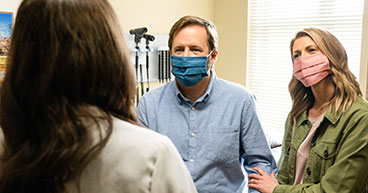
Receiving a blood transfusion may be potentially lifesaving for many cancer patients. While around 25 percent of the blood donated in the United States is used in cancer care, only 3 percent of Americans donate regularly. Combined with the current blood shortage, this makes donating blood and platelets more vital than ever.
“Cancer treatments such as chemotherapy and radiation can damage the bone marrow, leading to a reduced production of blood cells, and transfusions can help replenish these vital components” explains Lefan Zhuang, MD, Assistant Clinical Professor of the Department of Pathology and Medical Director of the Blood Donor Center at City of Hope® Cancer Center Duarte.
“Patients undergoing stem cell transplants also often need blood transfusions to support them prior to stem cell engraftment.”
This article covers the basics on donating blood and platelets, including:
- Blood transfusions for cancer
- Why do cancer patients need platelets?
- How many blood transfusions may a cancer patient have?
- What is bloodless medicine?
- The benefits of blood donation
If you’ve been diagnosed with cancer and are interested in a second opinion on your diagnosis and treatment plan, call us or chat online with a member of our team.
Blood transfusions for cancer
Blood transfusions play a crucial role in cancer care. Patients may need blood during or after certain treatments for a variety of reasons, including:
- Chemotherapy or radiation therapy may affect their body’s ability to produce as much blood as it needs
- Cancer surgery may cause blood loss, either during or after the procedure
Certain kinds of cancer or other conditions may also require patients to receive blood transfusions, including:
- Stomach, colon or other types of cancer that may cause internal bleeding.
- Blood cancers (leukemia, lymphoma and myeloma) that may damage the bone marrow, where blood is produced.
- Anemia
- Kidney failure
Dr. Zhuang says that one of the most common reasons cancer patients may need a blood transfusion is because they are undergoing a stem cell transplant.
“In general, stem cell transplant patients have a higher need for blood products,” she says. “Those who receive stem cells from an allogeneic donor—that is, someone other than themselves—are at increased risk of needing red blood cells and platelets.”
Why do cancer patients need platelets?
Platelets are small cell fragments that form in the blood. They help the blood to clot, reducing blood loss.
“When a patient has a very low platelet count, they are at risk for bleeding in the brain, which can be life-threatening,” Dr. Zhuang says. Many blood cancer patients have low platelet counts because their bodies are unable to produce enough platelets. In these cases, platelet transfusions can prevent these dangerous spontaneous brain bleeds.
While donated blood may be stored safely for more than a month, platelets last less than a week. This means that donors are more important than ever. Thankfully, Dr. Zhuang adds, “donors can give platelets every two weeks at City of Hope and whole blood every 56 days.”
How many blood transfusions may a cancer patient have?
“There is no limit to the number of blood transfusions a person can receive,” says Dr. Zhuang. Some patients receive blood transfusions every day as an inpatient or several times per week as an outpatient.
How often a cancer patient needs transfusions depends on several things, including the type of cancer he or she has and the patient’s treatment plan.
What is bloodless medicine?
Some patients may prefer not to receive blood transfusions for religious reasons or other concerns. Bloodless medicine is an approach that focuses on minimizing blood loss and optimizing your health. Some bloodless medicine strategies include:
- Using medications and techniques that help the blood clot, to avoid blood loss
- Reducing the amount of blood that is drawn before and during treatment
- Proactively managing anemia
- Using equipment that recycles blood lost during surgery
- Improving nutrition so your body can increase its own red blood cell production
The benefits of blood donation
The number of blood donors in the United States has been decreasing every year.
“This is in part because younger people are not as interested in donating blood and older donors have health issues which can defer them from donation,” explains Dr. Zhuang. “The best way to help cancer patients is to donate whenever possible and, if you cannot donate, to encourage family and friends to do so.”
The most vital blood type is O since all patients can receive transfusions of type O blood.
“Donors with type O blood should consider donating a platelet unit together with a red blood cell unit at the same time to help patients in multiple ways,” says Dr. Zhuang.
If you’ve been diagnosed with cancer and are interested in a second opinion on your diagnosis and treatment plan, call us or chat online with a member of our team.



